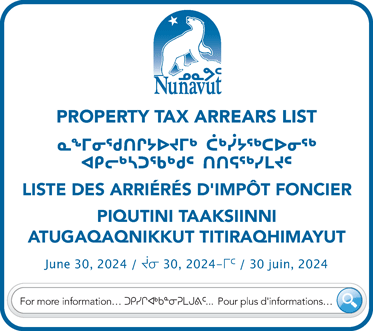Board issues stringent one-year water licence to Iqaluit
The Nunavut Water Board is imposing a strict one-year water licence on the Town of Iqaluit, and is ordering the Town to monitor contamination from the open burning of garbage.
IQALUIT — The Nunavut Water Board has clamped down on the Town of Iqaluit by issuing the municipality a one-year license that’s full of limitations on water use and waste management in Iqaluit.
The license’s conditions are far more stringent than those sought within the Town’s application for a six-year renewal of its water license.
The NWB did approve the Town’s request to continue to obtain fresh water from Lake Geraldine and upgrade the water treatment plant there. It also approved construction of the new sewage disposal system.
But the board stopped short of making any decision about the future of Iqaluit’s landfills, or restoration of its old dump sites.
It ordered the municipality to set up a monitoring program to gauge the level of contamination from open garbage burning on water quality.
Public hearings this fall
The NWB’s decision, dated Dec. 15, also calls for a new round of public hearings in the fall of 2000 to look at the Town’s solid waste management proposals.
By then, the board expects to have a clearer idea of whether open burning at the dump is contaminating fresh water.
And, if the Department of Indian and Northern Affairs and the Nunavut Government agree on who should monitor and enforce water licenses, the board will have a better handle on the extent of its authority.
The NWB decided not to stop open burning at the dump until its review of studies on contaminants and solid waste management, but it reserved the right to step in and douse the fires.
DIAND’s submission to the NWB earlier this year asserted that the board doesn’t have the jurisdiction to regulate open burning, air emissions or recycling.
The NWB decided that it isn’t, in fact, responsible for recycling, and instead, “strongly encourages any action on the Municipality’s behalf.”
But it rejected DIAND’s argument that the NWB can’t regulate open burning for the reason that air quality doesn’t affect water quality.
“The NWB concludes that the link between emissions and water quality would probably not be hard to establish, and that once established, the NWB has jurisdiction to regulate air emissions,” reads the decision.
This means that, after the Fall 2000 public hearings, the NWB could decide to step in, “exercise its jurisdiction to regulate burning at the landfill” and slap a ban on open burning at Iqaluit’s dump.
Enforcement?
In its decision, the NWB expressed disappointment that there aren’t any enforcement mechanisms for the provisions of its water licenses.
The Nunavut Department of Justice told the NWB that it’s “well within the Board’s mandate and jurisdiction to consider and implement measures which address monitoring and enforcement concerns.”
But the NWB finally decided that it can’t appoint inspectors or levy fines.
“The NWB derives its powers from the Nunavut Land Claims Agreement. The Agreement provides for the regulation by the NWB of the use of waters and the deposit or discharge of waste into water. It does not, however, set out measures for enforcement or penalties for offences,” reads the decision.
The board called on DIAND to take on a more active role in enforcement.
“The NWB urges DIAND in the strongest possible terms to take any action required to enforce the terms and conditions contained in licenses issued under either the NWT Waters Act or the NLCA,” reads the decision.
Although they may prove hard to enforce, numerous binding conditions were attached to the new license. These include tougher water quality controls, better public signage, and the submission of regular reports, updates and summaries — in Inuktitut and English — to the NWB.
The Town of Iqaluit must also study Lake Geraldine’s capacity to supply freshwater to Iqaluit, and it will have to set up guidelines for its new sewage treatment plant, and create a plan to decommission the existing lagoon.
The NWB also wants to see a monitoring program in place for the dykes around this lagoon, a spill contingency plan, and a testing program for any effluent going into Koojessee Inlet.
It asked for more information on how the sludge produced by the new system will be used.
The board’s decision criticized the Town’s construction of its new sewage facility before obtaining approval by the NWB, and the new license places stricter conditions on any future construction work.
“From now on, the Town will have to submit construction and operation schedules and have them reviewed and approved prior to construction,” the NWB says.
“The NWB agrees that a schedule for implementation is essential to effective planning, because, unfortunately and regrettably, the Town has built the new facility before receiving approval from the NWB to modify the old system,” reads the decision.
“This leap-frogging of the approval process should never happen again.”





(0) Comments